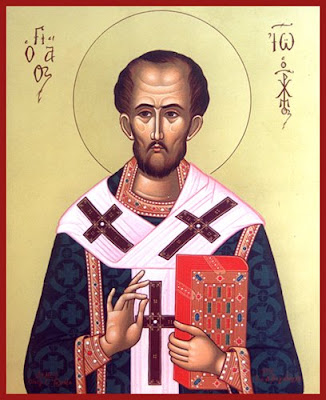 |
| Icon of St. John Chrysostom |
The Life of St. John Chrysostom
John was born in
Antioch in 349 to Greco-Syrian parents. Different scholars describe his mother
and his father was a high ranking military officer. John's father died soon after his birth and he
was raised by his mother.
He was baptised in 368 or 373 and
tonsured as a reader (one of the minor orders of the Church). As a result of
his mother's influential connections in the city, John began his education
under the pagan teacher Libanius. From Libanius, John acquired the skills for a
career in rhetoric, as well as a love of the Greek language and literature.
As
he grew older, however, he became more deeply committed to Christianity and
went on to study theology under Diodore of Tarsus, founder of the
re-constituted School of Antioch. According to the Christian historian Sozomen,
Libanius was supposed to have said on his deathbed that John would have been
his successor "if the Christians had not taken him from us".
He lived with extreme asceticism
and became a hermit in about 375; he spent the next two years continually
standing, scarcely sleeping, and committing the Bible to memory. As a
consequence of these practices, his stomach and kidneys were permanently
damaged and poor health forced him to return to Antioch.
John was ordained as a deacon in
381 by Saint Meletius of Antioch who was not then in communion with Alexandria
and Rome. After the death of Meletius, John separated himself from the
followers of Meletius, without joining Paulinus, the rival of Meletius for the
bishopric of Antioch, but after the death of Paulinus he was ordained a presbyter
(that is, a priest) in 386 by Evagrius, the successor of Paulinus. He was destined later to bring about
reconciliation between Flavian I of Antioch, the successor of Alexandria and
Rome, thus bringing those three sees into communion for the first time in
nearly seventy years.
In Antioch, over the course of
twelve years, John gained popularity because of the eloquence of his public
speaking, especially his insightful expositions of Bible passages and moral
teaching. The most valuable of his works from this period are his Homilies on
various books of the Bible. He emphasised charitable giving and was concerned
with the spiritual and temporal needs of the poor. He also spoke against abuse of wealth and
personal property:
“Do you wish to honour the body of Christ? Do not ignore him when he is
naked. Do not pay him homage in the temple clad in silk, only then to neglect
him outside where he is cold and ill-clad. He who said: "This is my
body" is the same who said: "You saw me hungry and you gave me no
food", and "Whatever you did to the least of my brothers you did also
to me"... What good is it if the Eucharistic table is overloaded with
golden chalices when your brother is dying of hunger? Start by satisfying his
hunger and then with what is left you may adorn the altar as well.”
He became the Archbishop of
Constantinople, was an important Early Church Father. He is known for his
eloquence in preaching and public speaking, his denunciation of abuse of
authority by both ecclesiastical and political leaders, the Divine Liturgy of
St. John Chrysostom, and his ascetic sensibilities. After his death in 407 (or, according to
some sources, during his life) he was given the Greek epithet chrysostomos, meaning
"golden mouthed" in English, and Anglicized to Chrysostom.
The Orthodox and Eastern Catholic Churches
honor him as a saint and count him among the Three Holy Hierarchs, together
with Basil the Great and Gregory Nazianzus. He is recognized by the Eastern
Orthodox Church and the Catholic Church as a saint and as a Doctor of the
Church. Churches of the Western tradition, including the Roman Catholic Church,
some Anglican provinces, and parts of the Lutheran Church, commemorate him on
13 September. Some Lutheran and many Anglican provinces commemorate him on the
traditional Eastern feast day of 27 January. The Coptic Orthodox Church of
Alexandria also recognizes John Chrysostom as a saint (with feast days on 16
Thout and 17 Hathor).
John is known in Christianity
chiefly as a preacher, theologian and liturgist. Among his homilies, eight
directed against Judaizing Christians remain controversial for their impact on
the development of Christian antisemitism. ....
Excerpts taken from Wikipedia
http://en.wikipedia.org/wiki/John_Chrysostom
Check also Catholic Encyclopedia
No comments:
Post a Comment